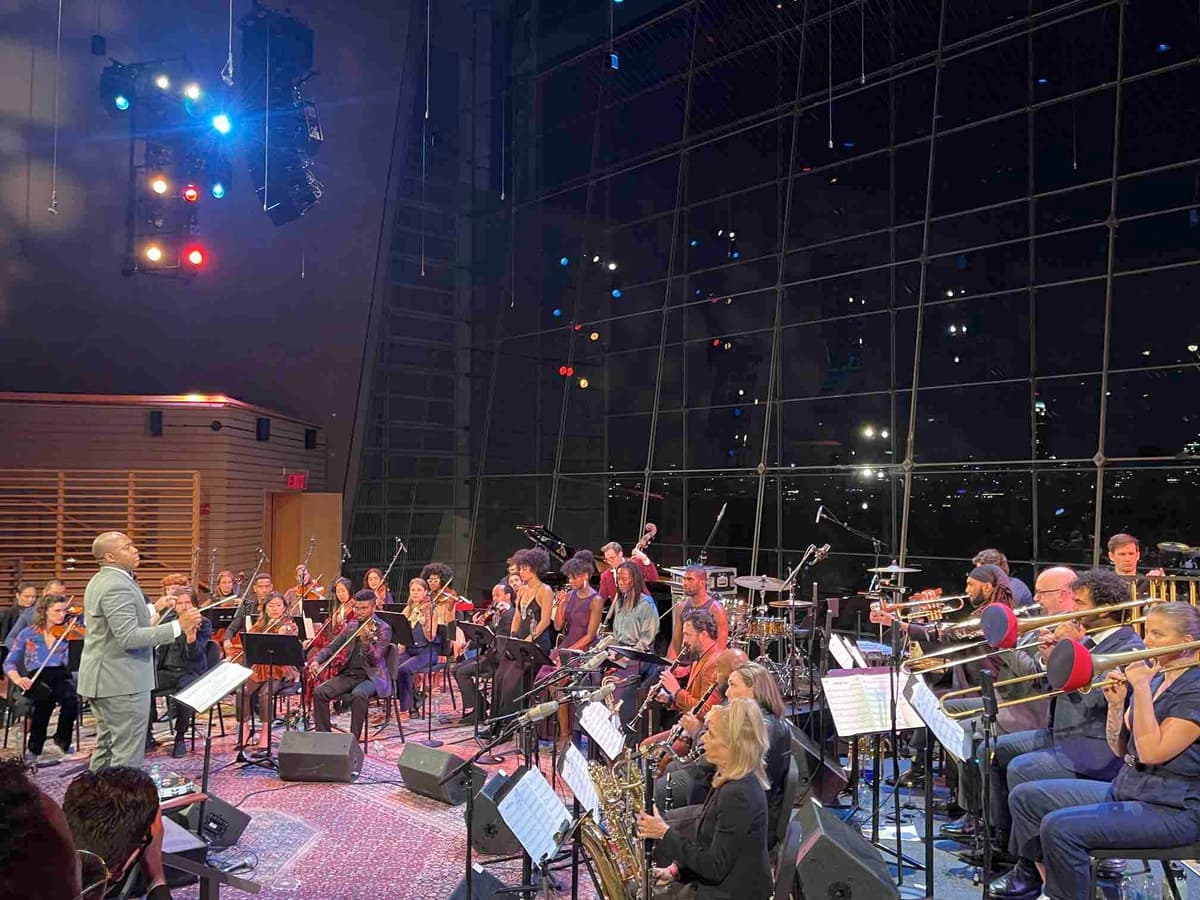The Multitalented Bryan Carter Celebrates Bayard Rustin and Produces Grace Kelly’s Latest
Carter is the young musician who in the current century is doing the best job of anyone of navigating between the worlds of jazz and musical theater.

Bryan Carter
‘Celebrating Bayard Rustin’
Streaming Through October 26
Grace Kelly With Strings
‘At the Movies’
Produced by Bryan Carter
Pazz Productions
There was a time about 60 years ago when the worlds of jazz and musical theater didn’t seem quite so far apart as these days. In the 1960s, there were versatile arrangers and orchestrators, such as Ralph Burns and Eddie Sauter, who could do the charts for a classic jazz or big band album one day and then deliver the orchestrations for an iconic Broadway show the next.
Bryan Carter is the young musician — a versatile drummer, arranger, composer, and bandleader — who in the current century is doing the best job of anyone of navigating between these two worlds: Last year, he won a Tony Award for his orchestrations to Marc Shaiman and Scott Wittman’s excellent score to “Some Like it Hot.”
This past weekend, he performed an exuberant concert of his music with a 32-piece chamber orchestra at the Appel Room at Jazz at Lincoln Center. He is also represented by a new album featuring an even-younger alto saxophone virtuoso, Grace Kelly, playing roughly 90 years’ worth of film themes and songs, also with a full string orchestra.
For the past few years, Mr. Carter has served as Jazz at Lincoln Center’s de facto representative to the LGBTQ community. Each June, he organizes a pride concert at Dizzy’s wherein he somehow crams an entire orchestra with strings onto that club’s stage. As such he’s the perfect individual to mastermind an evening of music dedicated to Bayard Rustin (1912-87), whose trials and tribulations as a civil rights leader were exacerbated by his status as a queer Black man.

“Celebrating Bayard Rustin” is essentially a two-part work, half of which is a selection of jazz standards and other songs that Mr. Carter and his ensemble perform in tribute to Rustin, starting on an exciting note with “Let the Good Times Roll,” an R&B classic from the conjoined songbook of Louis Jordan, Ray Charles, and Quincy Jones that the leader sings himself.
Over the next four songs, Mr. Carter gradually introduced his cast of four singers: Shenel Johns sang “Much More,” a beautiful, intimate ballad that’s too rarely heard outside of Act 1 of “The Fantastics,” and George Heers sang Mr. Carter’s tone-poem-style orchestration of “Lush Life” that recalled the premiere recording of that jazz classic by Nat King Cole and Pete Rugolo.
There was a clear distinction between the two baritones: Vuyo Sotashe is a contemporary crooner out of the tradition of Cole and Jimmy Scott, who gave us “A Nightingale Sang in Berkeley Square” — and later concluded the show with a sublime reading of “Theme from the ‘Valley of the Dolls.” J. Hoard, meanwhile, is an extravagant soul shouter who never fails to explode onto the stage every time he makes an entrance, as he did with Shania Twain’s “Man! I Feel Like a Woman.”
The evening centered around an eight-movement original work titled “Rustin in Renaissance,” which featured all four singers and numerous instrumental soloists from the ensemble. I was briefly reminded of Duke Ellington and Billy Strayhorn’s “A Portrait of Ella Fitzgerald,” the rare Ellington work to employ a narrator in the person of Ellington himself. “Renaissance” uses the voices as individuals and as a collective, in both song and narration.
It’s an ambitious piece that focuses on Rustin’s triumphs and the joy he brought into the world, rarely dwelling long on such low points as the disapproval he garnered from more conservative members of the movement, such as the Reverend Adam Clayton Powell, accurately portrayed by a sneering and leering Jeffrey Wright in George C. Wolfe’s excellent 2023 biopic “Rustin.”
The most surprising movement is “The Big Six Show,” a frantically jubilant number that could be opening title music for a 1960s cartoon program, with excellent solos by baritone saxophonist Lauren Sevian and Erica Von Kleist on fife.
Mr. Carter served as producer, conductor, and key arranger on Grace Kelly’s “At the Movies,” another highly ambitious project. It is evenly divided between songs introduced in Hollywood musicals and underscore themes for comedies and dramas. On some tracks, Mr. Carter essentially inserts Ms. Kelly’s saxophonic voice into a familiar piece of music, as on the opening “James Bond Theme,” which now has the alto wailing over the iconic pizzicato guitar background. Other pieces are more thoroughly reconstructed from the ground up; the swashbuckling theme to “Pirates of the Caribbean” now has a solid dance beat — and it’s not a sailor’s jig.
Much of “At The Movies” is unabashedly pop: Ms. Kelly has always been a jazz musician who values accessibility almost above all else. One such is Quincy Jones’s “Soul Bossa Nova,” which builds to a trade between Ms. Kelly and trumpeter Sean Jones, who lock horns in what might be seen as a symbolic representation of the ongoing battle between Austin Powers and Dr. Evil.
Conversely, there’s an eight-minute suite of themes by Ennio Morricone that hews closer to purely classical music. Ms. Kelly also sings winningly on several numbers — including the waltzes “True Love” and “Moon River” — with a small, intimate voice that invites comparison to Blossom Dearie. More impressively, she plays a thunderous baritone sax solo with slap-tongue effects on “Mission Impossible.”
“At The Movies,” which concludes with five Disney standards in a row, is an immensely satisfying album. I predict that I’ll keep playing it over and over — at least until the recorded version of “Celebrating Bryan Rustin” is released.

